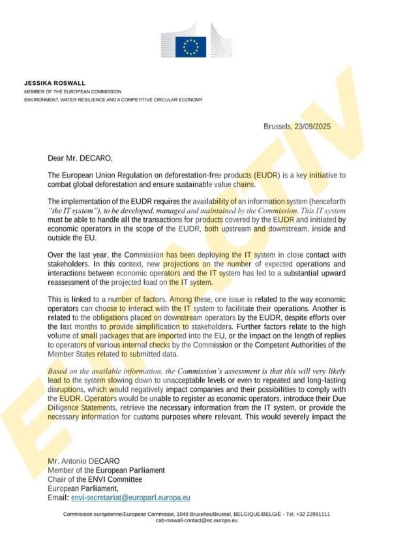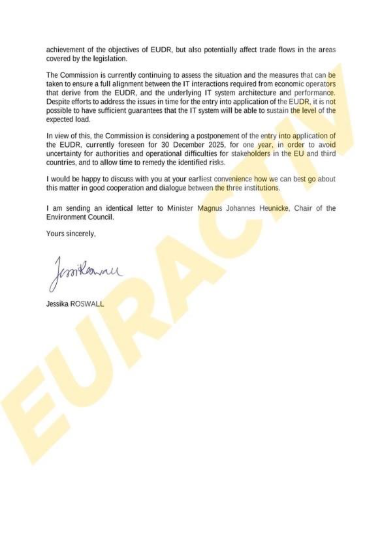EU Plans to Delay EUDR Implementation, What It Means for Global Supply Chains
- Gusi Ayu Putri Chandrika Sari

- Sep 24, 2025
- 5 min read
Editor’s Note:
This article was written as breaking news coverage of the European Commission’s reported plan to postpone the implementation of the EU Deforestation Regulation (EUDR). It includes cited quotes from Andre Mawardhi, Koltiva’s Knowledge Management team, offering expert commentary on the implications for global supply chains and emphasizing the urgency for companies to act despite the potential delay.
Executive Summary:
The European Commission is considering to delay the implementation of the EU Deforestation Regulation (EUDR) for a second time, shifting the start date from 30 December 2025 to late 2026. However, any delay must still be approved by the European Parliament and EU member states, so nothing is final at this stage.
The delay is reportedly due to concerns about the readiness of the IT platform that will handle compliance data, raising the risk of uncertainty and operational challenges for both authorities and businesses.
Regardless of whether the delay is confirmed, the direction is unmistakable: transparent, verified, and deforestation-free supply chains are becoming the global standard. Companies that act now, by investing in traceability, strengthening supplier capacity, and participating in collaborative industry initiatives, will be far better positioned once the regulation comes into force.
The European Commission is reportedly preparing to postpone the implementation of the EU Deforestation Regulation (EUDR) for a second time, postponing the ban on imports of commodities linked to forest destruction for another year (Reuters: 2025). This decision, driven by concerns over the readiness of the IT platform that will handle due diligence submissions, presents businesses with a rare opportunity: more time to prepare their supply chains for a new era of deforestation-free trade. However, any delay must still be approved by the European Parliament and EU member states, so nothing is final at this stage.
The EUDR is a landmark policy aimed at combating global deforestation. It mandates that companies importing key commodities such as palm oil, coffee, cocoa, cattle, timber, and rubber into the EU must prove that their products were not sourced from deforested or degraded land. By closing the door on deforestation-linked supply chains, the regulation represents a critical step toward reducing greenhouse gas emissions and halting biodiversity loss worldwide.
In a letter to the European Parliament’s Environment Committee and the Danish Presidency, EU Environment Commissioner Jessika Roswall highlighted concerns about the functionality of the IT platform managing compliance data, warning that it could create uncertainty for authorities and operational challenges for stakeholders. “In view of this, the Commission is considering a postponement of the entry into application of the EUDR, currently foreseen for 30 December 2025, for one year,” she added (Euractive: 2025).
More Than a Delay: A Call to Action
The delay has been met with mixed reactions. Some policymakers and industry stakeholders welcome the extra time, viewing it as an opportunity to address technical challenges and avoid bottlenecks when the regulation comes into effect. Others warn that postponing action could dilute the urgency of addressing deforestation-linked commodities.
At KOLTIVA, we see this with:
“Regardless of timing, the shift toward deforestation-free supply chains is irreversible. This is not a pause button; it is a chance to get it right. Companies should use this window to strengthen end-to-end visibility, from farm-level data collection and polygon mapping to risk assessment and corrective actions for risk mitigation.” Andre Mawardhi, Koltiva’s Knowledge Management Team.
Waiting until the last-minute risks both operational and reputational damage. Companies that invest now will not only be ready for EUDR but will also gain a first-mover advantage as similar regulations emerge in the UK, US, and other markets.
Three Actions Companies Should Take Now
Comprehensive Data Collection
Build accurate, farm-level datasets, including geolocation polygons to verify that commodities are not sourced from deforested areas.
Robust Risk Assessment
Leverage credible data to identify deforestation-risk hotspots across the supply chain, focusing compliance resources where they have the most impact.
Actionable Risk Mitigation
Collaborate with producers, cooperatives, and traders to implement corrective actions, capacity-building programs, and continuous monitoring for ongoing compliance.
Why It Matters Now
The timing of this announcement is especially significant, coming just after the EU concluded trade negotiations with Indonesia, the world’s largest palm oil exporter. Despite the delay, Indonesian producers and traders will still be required to meet EUDR criteria under the new deal, highlighting the regulation’s long-term inevitability.
For many businesses, the greatest challenge lies in supplier engagement. Smallholder farmers, who produce a large share of global commodities, often lack the tools and capacity to provide geodata and compliance documentation.
“This is where digital traceability platforms like KOLTIVA’s are transformative,” says Andre. “By integrating farm mapping, polygon verification, and real-time supplier data, companies can demonstrate compliance confidently, while empowering their suppliers to meet the new requirements.”
The Competitive Edge of Early Movers
Deforestation-free supply chains are not just a regulatory requirement; they are becoming a market expectation. Businesses that act now will:
Secure access to premium markets and preferred buyers.
Strengthen supplier relationships through the use of digital tools and capacity-building initiatives.
Position themselves as leaders in the global transition to sustainable trade.
The conversation around EUDR is not just about meeting a legal requirement; it is about transforming global supply chains to protect forests, ecosystems, and the communities that depend on them. Businesses that lead on this transformation will gain a competitive advantage, secure access to premium markets, and strengthen their reputation as sustainability champions.
Whether or not the Commission finalizes the delay, the direction is clear: transparent, verified, and deforestation-free supply chains are becoming the global standard. The companies that act decisively today will be the ones shaping and benefiting from the future of sustainable trade. Companies that act now, investing in traceability, building supplier capacity, and engaging in collaborative industry initiatives, will be better positioned when the regulation ultimately takes effect.
The delay offers a rare moment of breathing room, but not an excuse to stand still. As Andre from KOLTIVA’s Knowledge Management team reminds us,
“Delays may shift the deadline, but they do not change the destination. The future of the global supply chain is transparent, verified, and deforestation-free. The companies that act decisively today will define tomorrow’s market.”
Author: Social Media Practitioner at Koltiva
Expert Resources: Andre Mawardhi, Senior Manager Agriculture & Environment at KOLTIVA
About the Expert:
Andre Mawardhi is the Senior Manager of Agriculture & Environment at KOLTIVA, where he leads sustainable agriculture strategies and environmental compliance across global supply chains. With over a decade of experience in agri-environmental systems, Andre specializes in integrating climate-smart practices, traceability frameworks, and regenerative farming into multi-stakeholder ecosystems. His work bridges scientific insight with on-the-ground impact, ensuring smallholder inclusion and compliance with emerging regulations like the EU Deforestation Regulation (EUDR). Passionate about transforming food systems from the ground up, Andre plays a key role in shaping data-driven, sustainable sourcing solutions that benefit both producers and the planet.
Resources:
Euractiv. (n.d.). EU set to propose new delay to anti-deforestation rules. Retrieved from https://www.euractiv.com/news/eu-set-to-propose-new-delay-to-anti-deforestation-rules/
Abnett, K., & Brice, M. (2025, September 23). EU will delay anti-deforestation law by another year, commissioner says. Reuters. Retrieved from https://www.reuters.com/sustainability/climate-energy/eu-will-delay-anti-deforestation-law-by-another-year-commissioner-says-2025-09-23/














well, I still hope the EUDR moves ahead this year
my two cents: early movers will lead the sustainable trade future 💪